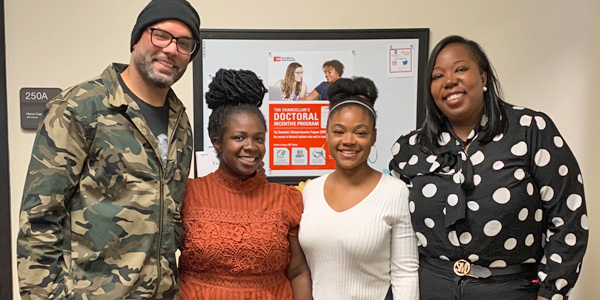 |
| From left: Terry Sivers, Reka Barton, Darielle Blevins and Asha' Jones. |
Editor’s note (Dec. 23, 4:40 p.m.): An earlier version of this post included a list of proposed speakers for a student-led program providing a critical exploration of slavery and reparations. The student has since opted to revise the program. The following article has since been revised and will be updated if new information becomes available.
Four students in the Joint Ph.D. Program in Education (JDP) offered by San Diego State University and Claremont Graduate University recently received $170,000 in funding from the Office of the Provost to bring programming designed to improve the experience of Black students to SDSU during the spring semester.
The students — Reka Barton, Darielle Blevins, Asha’ Jones and Terry Sivers — each received awards from the Student Success Fee (SSF), which funds student-led academic related programming outside of the classroom. In all, 91 student projects were funded by SSF for the 2019-20 academic year, including 16 proposed by students from the College of Education (see the full list of awarded proposals).
The funding garnered by Barton, Blevins, Jones and Sivers will support examinations of how Black people are depicted in the media, a speakers series on Black issues, a summit exploring the topic of slavery reparations and more.
“I'm just thrilled and so proud of my students who are doing amazing work,” said Dr. Marva Cappello, professor and chair of the JDP. “They're doing more than talking the talk. This is a real demonstration of advocacy.”
This work is because of the social justice and equity mission happening here in the JDP.
— Reka Barton, Joint Ph.D. Program student
Education as family
Jones, who works as a special assistant to the vice president in SDSU’s Division of Student Affairs, received $54,490 for a project titled “Improving African American Student Success.” Her goal is to find a way to better connect Black students to Black faculty and staff on campus. The idea is to create a sense of community — even family.“Working in higher ed and being a graduate student myself, I've found that when there's no sense of belonging, that causes students to want to retreat back to where they came from,” Jones said. “Also part of the African American community is the familiarity of family. If (students) feel they’re part of a program where they can feel the family unit, they're more likely to stay in school.”
With the funding, she plans to enable students from SDSU’s African American Mentoring Program to engage in research and present at a conference. In partnership with the Department of Africana Studies and the Black Resource Center, Jones is also setting up a speaker series featuring experts on issues including racial battle fatigue, domestic violence in Black families and police shootings.
“If we educate our people, we free our people,” Jones said. “That's what I hope to do through this speaker series.”
Spurring change
For Sivers, convening a summit around the issue of U.S. reparations for slavery goes beyond presenting a topic relevant to the Black community.“For me it's about the student body in general — to really get them to think critically and be exposed to information,” said Sivers, who is working with Jones on this project. “I think having the conversation about reparations will make change within our institutions a little more palatable.”
With a $68,000 award from SSF — the second-highest amount of funding received by any student — Sivers is in the process of bringing together thought leaders on the political, legal and economic aspects of reparations. Sivers is also planning for ally workshops, where students who are not Black can learn what’s at stake for them in reparations and how they can support the cause.
“We're bringing in some of the greatest thinkers and minds in terms of talking about race and racism, but also specifically their views and what they're doing about reparations,” Sivers said. “It's really an opportunity for this campus to be exposed to some of the greatest intellectual minds in this country in the areas of political and social activism.”
A reclaiming
While funded for separate projects, Barton and Blevins are essentially working together as a tag team on two separate but related projects.Barton received $33,060 for “Vision & SDSU: Justice in the Black Form,” funding an interactive forum featuring Harvard University Professor Dr. Sarah Elizabeth Lewis tentatively set for the last week of April. Lewis’ work explores how media images have negatively impacted the Black community, but also how Black people — even going back to abolitionists Frederick Douglass and Sojourner Truth in the 19th century — have used the visual medium to their advantage.
“It's not just about how we're being acted upon by all these visuals, but also how we have used visuals throughout our history,” Blevins said. “It's a reclaiming. Visual space is Black space, also.”
Meanwhile, with the $5,175 received by Blevins, the duo will lead a group of 5-10 undergraduate students to conduct research on representation of Black girls and Black hair in children's books. They will then present their findings at the American Educational Research Association annual conference in San Francisco in April.
“This work is because of the social justice and equity mission happening here in the JDP,” Barton said. “We see it in our faculty and in our director. We have a Ph.D. program where everyone is welcome, but I come here and see people who look like myself — it makes it very comfortable. This is the hardest thing you'll ever do in your life, so having that community here has been very important.
“And finding thought partners to do this work with is why we're able to do this.”
